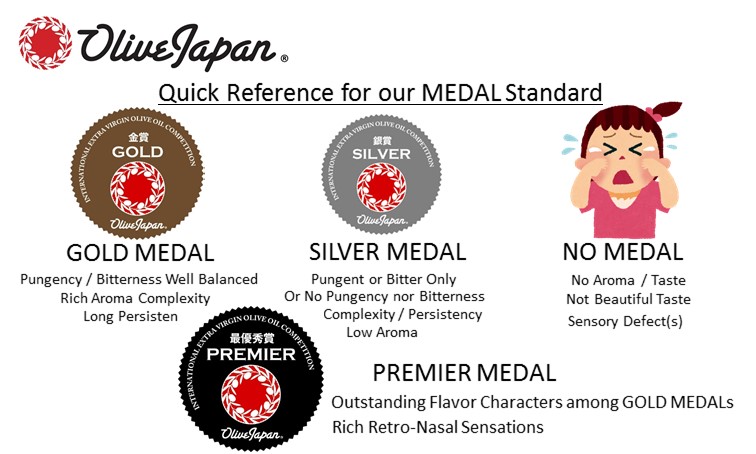1, PURPOSE
This Article defines the OLIVE JAPAN International Olive Competition Judgment Policy and its Protocol.
The Protocol of the sensory analysis judgment is basically according to “COI/T.20/Doc. no. 22 rev October 2018” as to define “ORGANOLEPTIC ASSESSMENT OF EXTRA VIRGIN OLIVE OIL APPLYING TO USE A DESIGNATION OF ORIGIN”, and “COI/OT/MO No 1/Rev.2 November 2011” as to define “METHOD SENSORY ANALYSIS OF TABLE OLIVES”.
2, PRINCIPAL – FAIRNESS
The OLIVE JAPAN International Olive Competition (the “Competition”) shall be held to the most fair and accurate judging. To secure this policy, the Competition and its organizer, the Olive Oil Sommelier Association of Japan (the “OSAJ”) shall be financially independent from any government, olive oil, and table olives industry and trade associations. The OSAJ shall not be in the olive oil / table olive business nor trade olive oil / table olive products in any way, besides olive oil / table olive purchases OSAJ makes for its study and educational purpose.
The Jurors for the Competition shall be fully supported and subsidized – travel expenses and accommodations – during the Competition by the organizer of the Competition, so that they shall not need to be supported by anybody.
All samples shall be received and handled completely out of sight of the jury at all times. If a judge enters the back room where samples are visible, they shall be immediately removed from any further judging.
No person who has knowledge of the identity of any samples shall be permitted to pass judgment on any samples in the competition. Only jury members who are completely blind of the identities of the samples shall judge.
Judges will be asked for a list of potential conflicts and these products shall be removed from their panel; no judge shall be asked to evaluate a product in which they have any commercial interest.
3, JUDGE
The Competition Panel Organizing Committee (the “Panel Committee”) shall determine the Jurors from the candidate lists provided by the OSAJ. The Panel Committee shall organize an appropriate number of panels for the Competition judgment and each panel shall consist of one panel leader with at least 2 panel members.
During the judgment, the panel leader shall lead discussion among the panel members to conclude the judgment result.
In order to keep Jurors’ sensitivity fresh and evaluation accurate, the judgment shall start in the morning time and shall be ended no later than 3:30 pm for each day session. The maximum number of samples presented for judging by each Juror shall not exceed 35 per day.
4, COMPETITION JUDGES’ CONFLICT OF INTEREST POLICY AND DISCLOSURE
In order to maintain the highest level of integrity of the Competition, no judge may enter any products from a company in which they or a family member have a financial interest. Additionally, all judges are required to provide full disclosure of any relevant industry involvement or relationships. Judges will be assigned to judge only those classes that present no appearance of conflict of interest.
5, FACILITIES AND MATERIALS
5.1 Glass for Tasting
The Olive Oil entry to the Competition shall be judged by utilizing “Blue Glass” as defined standard COI/T.20/Doc. no. 5, Glass for oil tasting.
“Blue Glass” shall be carefully washed by odor-free detergent and double-rinsed by clean water before utilization.
5.2 Accessories
The following accessories, which Jurors need to perform their task properly, shall be supplied in each position and shall be within easy reach:
- Standardized glasses containing the samples, code numbered, covered with a lid and kept at 28º C (within+ 2º C) by the warmer;.
- Hard or soft copy of the profile sheet;
- Pencil or ballpoint pen;
- Tray with slices of apple and plain yogurt;
- Glasses of carbonated water and still water at ambient temperature.
6, PROCEDURE OF JUDGING AND USE OF THE PROFILE SHEET
Each Juror on the panel shall sniff and then taste samples contained in the Blue Glass in order to analyze the olfactory, gustatory, qualitative retronasal and tactile sensations. In the profile sheet provided for this purpose he/she shall then enter the intensity with which each of the descriptors is perceived.
The panel supervisor shall collect the profile sheets completed by each Juror and shall review the intensities recorded. Should he/she find any anomaly, he/she shall invite the Juror to discuss such anomaly and, if necessary, to repeat the test.
All the oil shall be presented to Jurors without any information of producer’s name, product name brand name or region of origin; however, the cultivar name shall be provided. Cultivars that are rare or unusual shall be identified only as “other.”
In the event that a panel leader requests another opinion on an entry, it shall come from the leader and/or members of another panel.
VERIFICATION PROCEDURE: Samples that receive a borderline score of “no medal” shall be confirmed in separate judging by a second panel. Candidate oils for the Premier Award shall be confirmed in separate judging by a second panel.
The profile sheet shall be the OLIVE JAPAN original sheet based on the Mario Solinas profile sheet for olive oil awards.
7, REVIEW AND FEEDBACK
The Competition shall aim to support and promote producers’ quality consciousness. For this purpose, Jurors’ comments in the profile sheet shall be provided to all the entrants of the Competition via email; however, the profile sheet shall not be disclosed to anybody.
8, ENTRY SAMPLES
After the judgment, all the samples shall be transfered to the OSAJ for its study and tasting in the classroom. The entry products shall not be returned to entrants and shall not be re-sold to any third party body.
9, BINDING FORCE
This Article was made on November 23rd, 2013 and revised on October 10th, 2025, and is applicable for all the registered entries to the Competition binding with the Contest Rules appeared on the same website here. The English and Japanese written documents of the Article will be considered official for the Competition.
References for MEDAL Standard Quick Guide;

